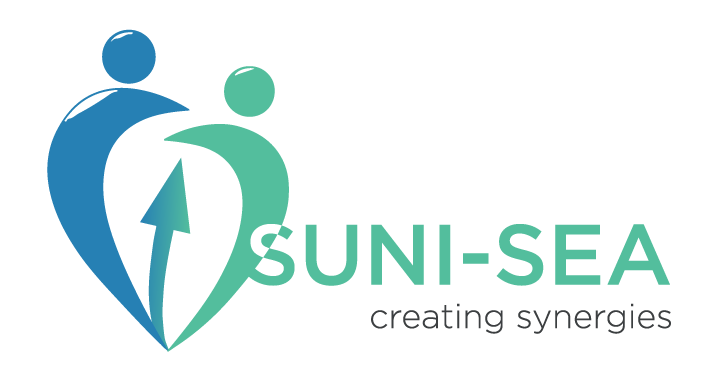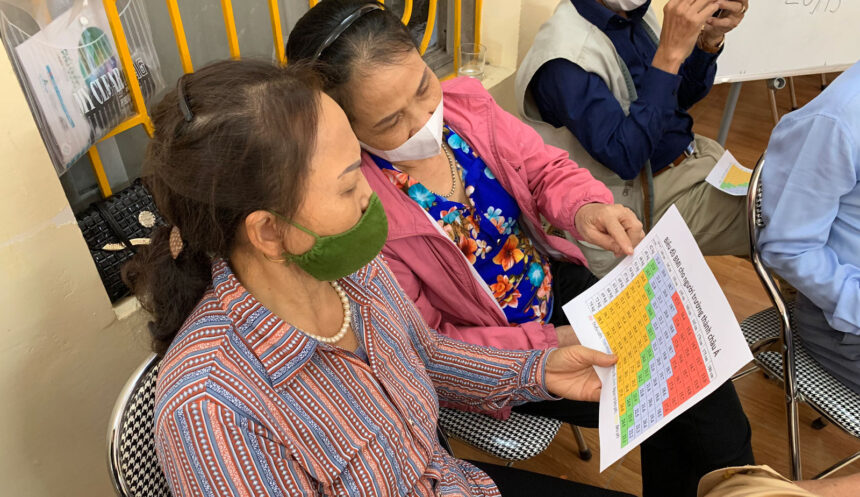The situation of the COVID-19 pandemic in Vietnam had created all kinds of complications, but with the high rate of COVID vaccination coverage, the spread of the virus in many areas of Vietnam has been gradually controlled; we are now adapting to a “new normal” phase.
During November 2021 to January 2022, HelpAge International in Vietnam in collaboration with the Vietnam Association of the Elderly (VAE) and the Provincial/City Elderly Associations have implemented many SUNI -SEA project activities in Hai Phong and Ninh Binh provinces. During this time the COVID-19 prevention measures were strictly followed.
In November 2021 (from 1-8 and from 25-30 November), three non-communicable diseases (NCDs) training courses for 14 Intergenerational Self-Help Clubs (ISHCs) were organised in Hai Phong. The four-day courses involved club management boards (CMBs), the ISHCs health volunteers, local health staff, and the local Association of the Elderly. The participants were provided with basic knowledge about the prevention and management of hypertension and diabetes, and practiced skills for conducting community level screening to identify people at risk of hypertension and diabetes and refer them to the health facility.
In addition, the volunteers and government health staff discussed the mechanism of coordination between the ISHCs and the local health sector, for the management of these two diseases. Attendees were very excited and actively participated in the training sessions. Upon completion of the course, participants reported that they were equipped with the new knowledge and skills that will enable them to apply and integrate NCDs community screening and health promotion messages for NCDs into their club’s routine activities.
During 16-18 November, HelpAge and VAE conducted a monitoring and technical support visit to the Provincial Association for the Elderly, provincial research facilitator and 7 ISHCs in Ninh Binh. The activity aimed to provide support to the ISHC board members and health volunteers for the implementation of SUNI -SEA project community non communicable diseases (NCDs) activities according to their workplan objectives, identify solutions for challenges, provide guidance on how to fill in the ISHCs registration book and reporting forms, and provide supportive supervision and encouragement to the Ninh Binh Association of the Elderly to coordinate and collaborate with the health sector for ISHCs community screening activities.
In December 2021 and January 2022, 3 ISHCs in Ninh Binh (Tu Duong ISHC, Binh Yen ISHC, Binh Hoa ISHC) organised NCDs screening events for ISHC members, to identify people with risks and refer them to the health facility. The participation rate for screening club members reached 98-100 per cent. To ensure the local COVID-19 prevention requirements, the ISHCs organised flexibly screening events in two ways: at the ISHC centre, and at home. The club management board and health volunteers divided members into groups for the screening activities at the ISHC, each group did not exceed 20 people. Members who were sick or had difficulty walking, were being screened at their own home. After screening, Tu Duong ISHC detected 14 people at risk of hypertension and 3 people at risk of diabetes, Binh Yen ISHC detected two people at risk of hypertension and one person at risk of diabetes. The people at risk were consulted by the club management board, and then the health volunteers referred them to the Commune Health Station for further examination.
The chairperson of Binh Hoa ISHC, Ms Hoang Thi Cuc said “The club members who were diagnosed with an NCD from the previous screenings all take the medicine as directed by the doctor. Their condition has improved a lot.”
 Tu Duong ISHC worked in collaboration with the Commune Health Center and received health staff support for organising screening activities. The health staff provided medication for hypertensive members and scheduled an appointment at the commune health station for members at risk of diabetes. Although the other two ISHCs did not have the support of the Commune Health Station due to the COVID-19 workload of the health staff, they mobilised club members who were retired doctors and nurses with expertise to support the screening process.
Tu Duong ISHC worked in collaboration with the Commune Health Center and received health staff support for organising screening activities. The health staff provided medication for hypertensive members and scheduled an appointment at the commune health station for members at risk of diabetes. Although the other two ISHCs did not have the support of the Commune Health Station due to the COVID-19 workload of the health staff, they mobilised club members who were retired doctors and nurses with expertise to support the screening process.
Working with the community required agility and flexibility. While the quality of the programme is the core of our work, each ISHC was encouraged to take an approach that works well within their community settings. With ongoing training, coaching and technical support the ISHCs will continue to strengthen their skills and confidence and remain relevant to older people in Vietnam.








